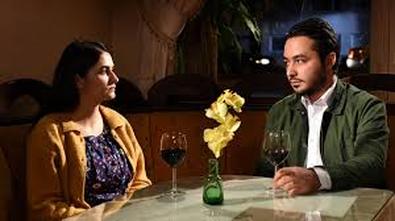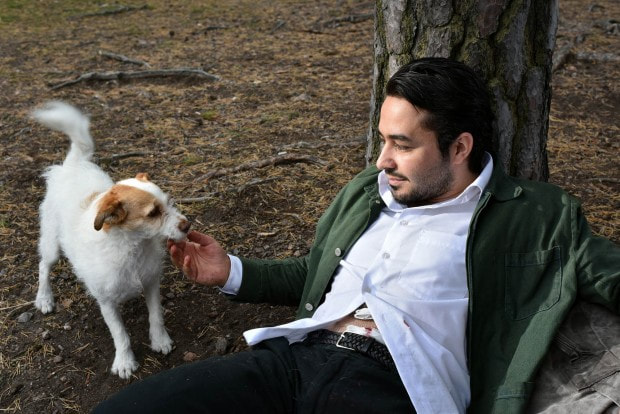
Reviewed by John Semley / The Globe & Mail
The Other Side of Hope intertwines the stories of two itinerant protagonists: Khaled (Sherwan Haji), a young Syrian refugee who drifts into Helsinki harbour as a stowaway; and Wikstrm (Sakari Kuosmanen), a travelling salesman turned restaurateur, who finds Khaled sleeping outside his diner and hires him as a cleaner and dishwasher.
Early in The Other Side of Hope, Finnish writer/producer/director Aki Kaurismaki's latest, Syrian refugee Khaled (Sherwan Haji) arrives at a Helsinki police station to present himself to authorities and claim political asylum. He hesitates for a moment outside the precinct and lights a cigarette. The camera cuts to show to Finnish cops, themselves enjoying a cigarette. Then Khaled proceeds inside the station, where the cop jockeying the front desk is also puffing away.
In Kaurismaki's films pretty much everyone is always smoking. Indeed, smoking is inextricable from the gentle, funny, world-weary, always deeply humanist worldview that the Finnish filmmaker, himself a prodigious smoker, has been developing on screen for more than three decades. Cigarettes come to signify social bonds, like a great, cancerous leveller. And more than this, they express a guiding fatalism which Kaurismaki's movies both indulge and resist: The world is a pit, we're all doomed, so we might as well smoke. As a vice, a hobby, a mere thing to do, smoking is a way of taking ownership of destiny.
Like Kaurismaki's previous film, 2011's Le Havre, The Other Side of Hope deals primarily with the ongoing immigrant crisis in Europe. The contemporary relevance of this issue makes The Other Side of Hope feel topical. It's a rare feat for a director whose films, from their muted humour and dated-seeming mise-en-scène, to their use of flat, unexpressive, Bressonian close-ups of characters, have always seemed weirdly outside of time.
The film follows the young, stone-faced Khaled from his arrival on a cargo ship, his face and clothes blackened with soot, through his struggles assimilating in Finland. When his asylum request is denied by gormless bureaucrats willfully oblivious to the severity of the political violence in Syria, Khaled ducks deportation and finds under-the-table work in a restaurant. He's taken in by Wikstrom (Sakari Kuosmanen), a recently divorced salesman who enters the food and drink sector following a particularly profitable night at the card table. "A profitable business," he's told. "People drink if times are bad. Even more if things go well."
The prophecy doesn't exactly augur well. Wikstrom inherits a mess of a restaurant, with much of the film's comedy arising from the bungling staff's desperate efforts to keep things afloat. In one hilarious sequence, the Finnish staff dresses in brightly coloured kimonos, attempting to rebrand as a sushi place – an incisive comment on the desperate cultural desire to embrace globalization, while ignoring its political victims, such as Khaled.
In Khaled, The Other Side of Hope finds a rare expression of the refugee experience that defiantly bucks the mawkish and the maudlin. But it's in the hard-nosed wannabe-restauranteur Wikstrom that Kaurismaki creates his definitive character. He again expresses that idea of pushing back against fate and the flooding cruelty of humankind, despite being himself pretty much wholly unpleasant: curt, brusque, impenetrable and perpetually frowning. We first meet Wikstrom as he leaves his wife, packing up a simple suitcase and unceremoniously placing his house keys and wedding band on the kitchen table, like a renegade cop turning in his gun and badge. He is, in short, no hero. He's not even particularly likeable.
But then that's the thing, isn't it? In Kaurismaki's films, being good and decent isn't a matter of heroism or bold, transparently "selfless" gestures. In La Vie de Bohème, a starving artist shares a piece of fish with another, despite their being strangers. In The Match Factory Girl, a family disowns their daughter, but offer her an orange (her favourite) as a parting gift, despite their anger. The guiding ethic of The Other Side of Hope is as much topical as it universal: that altruism is not especially brave or courageous, but just the basic principle governing relations between human beings. It can be something as grand as stowing an asylum-seeker away in your restaurant's storage closet. But most of the time, it's something as simple as sharing a cigarette.
The Other Side of Hope intertwines the stories of two itinerant protagonists: Khaled (Sherwan Haji), a young Syrian refugee who drifts into Helsinki harbour as a stowaway; and Wikstrm (Sakari Kuosmanen), a travelling salesman turned restaurateur, who finds Khaled sleeping outside his diner and hires him as a cleaner and dishwasher.
Early in The Other Side of Hope, Finnish writer/producer/director Aki Kaurismaki's latest, Syrian refugee Khaled (Sherwan Haji) arrives at a Helsinki police station to present himself to authorities and claim political asylum. He hesitates for a moment outside the precinct and lights a cigarette. The camera cuts to show to Finnish cops, themselves enjoying a cigarette. Then Khaled proceeds inside the station, where the cop jockeying the front desk is also puffing away.
In Kaurismaki's films pretty much everyone is always smoking. Indeed, smoking is inextricable from the gentle, funny, world-weary, always deeply humanist worldview that the Finnish filmmaker, himself a prodigious smoker, has been developing on screen for more than three decades. Cigarettes come to signify social bonds, like a great, cancerous leveller. And more than this, they express a guiding fatalism which Kaurismaki's movies both indulge and resist: The world is a pit, we're all doomed, so we might as well smoke. As a vice, a hobby, a mere thing to do, smoking is a way of taking ownership of destiny.
Like Kaurismaki's previous film, 2011's Le Havre, The Other Side of Hope deals primarily with the ongoing immigrant crisis in Europe. The contemporary relevance of this issue makes The Other Side of Hope feel topical. It's a rare feat for a director whose films, from their muted humour and dated-seeming mise-en-scène, to their use of flat, unexpressive, Bressonian close-ups of characters, have always seemed weirdly outside of time.
The film follows the young, stone-faced Khaled from his arrival on a cargo ship, his face and clothes blackened with soot, through his struggles assimilating in Finland. When his asylum request is denied by gormless bureaucrats willfully oblivious to the severity of the political violence in Syria, Khaled ducks deportation and finds under-the-table work in a restaurant. He's taken in by Wikstrom (Sakari Kuosmanen), a recently divorced salesman who enters the food and drink sector following a particularly profitable night at the card table. "A profitable business," he's told. "People drink if times are bad. Even more if things go well."
The prophecy doesn't exactly augur well. Wikstrom inherits a mess of a restaurant, with much of the film's comedy arising from the bungling staff's desperate efforts to keep things afloat. In one hilarious sequence, the Finnish staff dresses in brightly coloured kimonos, attempting to rebrand as a sushi place – an incisive comment on the desperate cultural desire to embrace globalization, while ignoring its political victims, such as Khaled.
In Khaled, The Other Side of Hope finds a rare expression of the refugee experience that defiantly bucks the mawkish and the maudlin. But it's in the hard-nosed wannabe-restauranteur Wikstrom that Kaurismaki creates his definitive character. He again expresses that idea of pushing back against fate and the flooding cruelty of humankind, despite being himself pretty much wholly unpleasant: curt, brusque, impenetrable and perpetually frowning. We first meet Wikstrom as he leaves his wife, packing up a simple suitcase and unceremoniously placing his house keys and wedding band on the kitchen table, like a renegade cop turning in his gun and badge. He is, in short, no hero. He's not even particularly likeable.
But then that's the thing, isn't it? In Kaurismaki's films, being good and decent isn't a matter of heroism or bold, transparently "selfless" gestures. In La Vie de Bohème, a starving artist shares a piece of fish with another, despite their being strangers. In The Match Factory Girl, a family disowns their daughter, but offer her an orange (her favourite) as a parting gift, despite their anger. The guiding ethic of The Other Side of Hope is as much topical as it universal: that altruism is not especially brave or courageous, but just the basic principle governing relations between human beings. It can be something as grand as stowing an asylum-seeker away in your restaurant's storage closet. But most of the time, it's something as simple as sharing a cigarette.
DISCUSSION FOLLOWS EVERY FILM!
$6.00 Members / $10.00 Non-Members
TIVOLI THEATRE
5021 Highland Avenue I Downers Grove, IL
630-968-0219 I www.classiccinemas.com
We apologize—Movie Pass cannot be used for AHFS programs.
$6.00 Members / $10.00 Non-Members
TIVOLI THEATRE
5021 Highland Avenue I Downers Grove, IL
630-968-0219 I www.classiccinemas.com
We apologize—Movie Pass cannot be used for AHFS programs.








